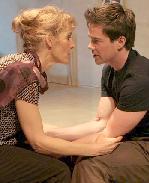SITE GUIDE
SEARCH
REVIEWS
FEATURES
NEWS
Etcetera and
Short Term Listings
LISTINGS
Broadway
Off-Broadway
NYC Restaurants
BOOKS and CDs
OTHER PLACES
Berkshires
London
California
New Jersey
DC
Philadelphia
Elsewhere
QUOTES
TKTS
PLAYWRIGHTS' ALBUMS
LETTERS TO EDITOR
FILM
LINKS
MISCELLANEOUS
Free Updates
Masthead
Writing for Us
A CurtainUp Review
Fate's Imagination
|
—
|

Elizabeth Norment and Jed Orlemann in Fate's Imagination
(Photo: Monique Carboni) |
|
Time means nothing to you. I've been glued to the past, wasted countless nights unraveling the torment of days gone by. I've been invisible to myself. But now I choose to reveal myself to you because I want you as a friend, as a lover, as anything you can be.— Lilah
|
A series of dialogues punctuated by monologues, Fate's Imagination is certainly topical, in fact, almost disconcertingly so. In the play and in real life, the Senator's voting in favor of the war in Iraq is a controversial issue, and even the recent scientific mystery of the death of large numbers of bees in North America gets thrown in for additional symbolic punch.
Cellphone ring tones and adventures in the blogosphere add to the contemporary feel of the play, but this is at heart an old school love triangle with an intergenerational twist. Jed Orlemann's Brock is all big paws and shiny coat. He's eager, attractive and callow with a much bigger bark than bite. Both of the women, however, come across as selfish bitches looking to control the puppy for their own purposes. The play wanders on the verges of such sexist tropes, with Donna presented as the cold, castrating mother who orders her son out to the car and Lilah as the emotionally starved, manipulative spinster who wants to devour him.
Much in this production is elegantly and effectively done. There's costume designer Erin Murphy's navy blue power suits and pearls for Donna, Liliah's come hither silk kimono and Brock's studied slacker sloppiness. Robin Vest's scenic design features a wall full of photographic portraits and lightboxes that alternatively create Lilah's apartment, a New York nocturnal cityscape and a seat on the redeye ready for takeoff. Atmospheric music and original compositions are provided by Robert Kaplowitz and Benjamin Krech's lighting alternates between cool polar blues for encroaching frigidity and warmer romantic tones that soften the hard edges and crows feet.
Unfortunately, the actor's have a hard time infusing emotional reality into their characters as they debate their entangled emotional lives and alternately use insults and imprecations as leverage in their power games. Donna Mitchell has the politician's chopping hand gestures down pat, but her character explains rather than shows her internal terrain.
Elizabeth Norment's Liliah with her bitter, downturned mouth cajoles and hectors through a decades-long miasma of hurt, but the character speaks in a collection of convoluted and eventually tiresome aphorisms such as "the young rarely contemplate their conclusions," and"a desperate woman will not hesitate to use deception to survive."
Brock, the journalist with aspirations to become a novelist, remains the most unknown. Though by the end of the play he has exposed himself in a mechanical fashion and has made a life-changing decision, he is relegated to the position of a pawn in the struggle between the two women. Jed Orlemann reminded me of the mugging actor French Stewart from the television sitcom Third Rock from the Sun to who, he bears a slight resemblance slightly. Without stronger, deepen connections between the characters in the script, the actor fills the void with behavior, that although often apt, feel forced. There isn't heat here because the arguments of the character and playwright ultimately keep the play in the realm of a cerebral exercise.
What playwright Randall David Cook has done in Fate's Imagination is illustrate the ways in which women are often still forced into perversions of the heart or the mind when they seize power that should rightfully accrue to them. The topical overlays feel unnecessary to a rich examination of the battlefield of the heart.
|
FATE'S IMAGINATION By Randall David Cook Directed by Hayley Finn Cast: Donna Mitchell (Susan), Elizabeth Norment (Lilah), Jed Orlemann (Brock) br> Scenic Design: Robin Vest Costume Design: Erin Murphy Lighting Design: Lucas Benjamin Krech Sound Design and Original Compositions: Robert Kaplowitz Projection Design: luckydave Running Time: One hour and fifty minutes with no intermission Gotham Stage Company at The Players Theatre 115 Macdougal Street 212-352-3101 www.gothamstage.com From 5/25/07 through 6/17/07; opening 6/1/07 Tickets: $20. Reviewed by Christopher Murray based on May 29th performance |

Easy-on-the budget super gift for yourself and your musical loving friends. Tons of gorgeous pictures.

Leonard Maltin's 2007 Movie Guide

At This Theater
Leonard Maltin's 2005 Movie Guide

 >
>

